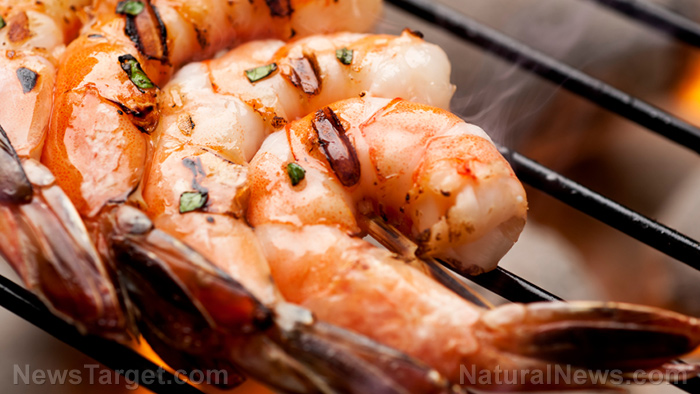Impossible Burgers are LOADED with estrogen, claims researcher… but is it true?
12/28/2019 / By Ethan Huff

Fast food chain Burger King has been widely promoting its new meatless “Impossible Whopper” as a “plant-based” alternative to traditional beef Whoppers. But Dr. James Stangle, a veterinary doctor, says that these 24-ingredient “artificial meat” patties are an estrogenic nightmare for the humans eating them.
However, Dr. Stangle doesn’t link to any lab results supporting his assertion of the high levels of estrogen in Impossible Whoppers.
On the Impossible Foods website for Burger King, the company openly admits that Impossible Whoppers are made “mostly” of soy protein, which we previously reported is a testosterone antagonist, especially in men. And according to Stangle – though we haven’t verified this in our own lab – the amount of soy protein and other estrogenic substances in Impossible Whoppers amounts to 44 milligrams (mg) of estrogen per burger, compared to just 2.5 nanograms of estrogen in regular beef.
[Editor’s note: We believe this claim of 44 mg of estrogen in one Impossible Whopper is unlikely to be true. However, there is certainly some level of estrogen found in these fake meat patties, and we hope to be able to locate reputable lab tests that are reporting on the levels being found. We could theoretically run these tests in our own lab, but we are currently focused on glyphosate and other herbicides.]
What we can verify is that Stangle is right about hormonal dangers associated with soy protein, which more often than not is genetically modified (GMO). What this suggests is that Impossible Whoppers are not only estrogenic but also potentially dangerous in our view, considering the fact that GMOs are linked to food allergies, digestive problems, autism, and reproductive malfunction.
In addition to being estrogenic and GMO, soy protein is NOT a complete protein
Another thing to consider about soy protein versus beef protein is that soy protein has less functional, or usable, protein value compared to beef protein. While beef protein contains 79 percent of the required level of the rate limiting amino acid tryptophan, soy protein contains only 41 percent of the required level of the rate limiting amino acid methionine.
What this means, based on Stangle’s calculations, is that an Impossible Whopper contains only about 10 grams of usable protein, while regular beef Whoppers contain 22 grams of usable protein – “[s]o you would have to eat two and a quarter [I]mpossible [W]hoppers to get the same protein in one [W]hopper,” he notes.
“… not all proteins are created equal,” Stangle further explains. “There are 20 amino acids. Nine of which are essential, meaning your body cannot make them so they are required in the diet. Each of those essential amino acids must meet a certain level to make a complete protein profile. If any essential amino acid does not hit the required amount, it is said to be rate limiting.”
“As an analogy, picture nine chains connected in a line,” he goes on to state. “All of the chains need to lift 100 pounds to carry the load. If one chain can only support 50 pounds, it doesn’t matter how much the others can support. The 50-pound chain is the rate limiting chain.”
Fake meat with “fake blood” molecules created by genetically engineering plants
Here’s another little tidbit that might interest you: Another of the main ingredients in Impossible Whoppers, heme, is created by artificially splicing a gene derived from hemoglobin into yeast. Also known as soy leghemoglobin, this iron-containing molecule is what makes Impossible Whoppers appear red like regular meat, though its addition to the fake meat makes it even more fake and GMO than if it just had GMO soy protein.
The whole thing is an artificial disaster, even if Stangle’s 44 mg estrogen claim turns out to be exaggerated. He’s definitely right about one thing: Impossible Whoppers are not natural, nor are they preferable to real beef, especially grass-fed beef that’s much healthier than its feedlot-based counterparts.
Not only that, but Impossible Burgers contain so much vegetable oil to make up for the lack of natural fat that Tom Pappert, writing for National File, describes this culinary monstrosity as “a genetically modified organism filled with calorie-dense oils that can make a man grow breasts if eaten in sufficient quantity.”
Perhaps Burger King is hoping to become the new hub of transgenderism achieved through artificial food? Get out your man boob bras, because fake meat might just help you qualify to be the star of the next Drag Queen Story Hour where you get to read children’s books to first graders while pretending to be a woman.
After all, if we can have Impossible Whoppers, can you think of a bigger, more impossible whopper than the lie that men can become women?
For more related news about GMOs, be sure to check out GMO.news.
Sources for this article include:
Submit a correction >>
Tagged Under:
Burger King, chemicals, Dr. James Stangle, estrogen, fake meat, genetic engineering, GMO, Impossible Burger, plant-based, processing, protein, toxic ingredients, vegan, Whopper
This article may contain statements that reflect the opinion of the author
RECENT NEWS & ARTICLES
COPYRIGHT © 2017 FOOD SCIENCE NEWS





















